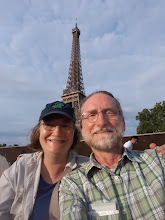Names
Many people who follow this blog know the children only by their English first names. At home, however, and among the extended family, we use their Ukrainian names, and those are the names I'm using as I write my posts. So let me explain who is who, for those of you outside the family. The pronunciation guide is how I say their names, although the children tell me I pronounce their names like an American!Paul Ruslan (pronounced ROOS-LAHN')
Adam Bogdan (BOHG-DAHN')
Rachel Ludmila; nickname: Luda (LOOD-MIH'-LUH, LOO'-DUH)
Sarah Oleana; nickname: Lena (O-LEH'-NA, LEH'-NA)
David Mihailo; nickname: Misha (MIH-HIGH'-LOH, MEE'-SHUH)
Mikola, nickname: Kola (MIH-KOH'-LUH, KOH'-LUH)
(It's important to pronounce Misha's name as MEE'-SHA, because MIH'-SHA means "mouse" in Ukrainian.)
Before traveling to Ukraine in 2005, Jonathan and I thought long and hard about names. We decided to give the children English first names, so they could blend in at their American school. But we retained their Ukrainian names, which are such a part of their identity. Could you imagine being called by a name for the first ten years of your life, and then lose it altogether? Also, since we used their Ukrainian names for about a week before we gave them English names, we got to know them by their Ukrainian names. They are Ruslan, Bogdan, Luda, Lena, and Misha to us.
We haven't given Mikola an English name yet, because we learned in 2005 that we can't name a child until we've met him/her. One of Jonathan's brothers is David Stahlke, and we originally didn't want duplication of names within the extended family. But Misha reminded us of David (the brother), and we chose him as Misha's godfather. Misha delights in the fact that there are now two David Stahlkes!
We have always given the children their choice of name for any particular situation. Early on, it became clear they wanted their English names for all public places--school, the neighborhood, church, doctors' offices, etc. I have to remember to use their English names in these situations, and it often feels like I'm translating in my head.
The adoption literature that we've studied often mentions the losses that adoptive parents and children face. The children have lost their birth family, country, culture, etc., and the adoptive parents have lost biological continuity, privacy (due to doctors and social workers), the experience of pregnancy and birth, etc. Of all these losses, adoption heals only a few of them--our need to parent, and the children's need to have a family. But many of the other losses are ones we and they will deal with for a long time. One loss for me is that the names we chose for our children are not the names that I use for them, and it feels foreign to me to call them Paul, Adam, Rachel, Sarah, and David. But this is a case where my needs as a mother must be secondary to their needs as my children. They have lost almost everything of their Ukrainian lives--and I cannot take away the most basic element of their heritage and identity--their Ukrainian names.


0 Comments:
Post a Comment
<< Home